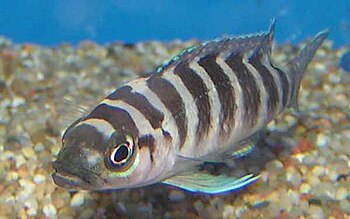 |
| Adult Neolamprologus cylindricus in an aquarium (Photo credit: Wikipedia) |
First, you must decide which of the three lakes you want to set your aquarium up to imitate. African cichlids come from Lake Tanganyika, Lake Victoria, and Lake Malawi. All three of these lakes have hard water with a high pH. I would suggest starting with mbunas from Lake Malawi. Mbunas are a class of rock-dwelling, mouthbrooding, and omnivorous cichlids. The common varieties can be found in most local pet shops and are not very expensive.
Mbunas require a lot of space and hiding spots in their aquarium. You should use a 55-gallon aquarium or larger to keep these cichlids. You can use limestone or holy rock (limestone rock with lots of holes) and caves. These are usually placed towards the rear of the tank which allows for a free swimming area at the front of the tank. A common substrate used in mbuna aquariums is crushed coral. Using crushed coral as the substrate helps maintain the elevated pH and water hardness.
Cichlid tanks require a lot of filtration to keep the inhabitants healthy. I usually use two large sponge filters in each of the rear corners in combination with a large filter hanging on the back of the tank or two smaller ones submerged within the tank. The hanging filter (or the submersed ones) cleans particulate matter from the aquarium while the sponge filters house large quantities of the bacteria which convert ammonia to nitrites and the nitrites to nitrates.
African cichlids require a water temperature of around 80 degrees F. This will most likely require a 150-watt heater on each end of a 55-gallon tank. The submersible type with a temperature setting is preferred. They cost a little more but are worth it. They will last much longer than the less expensive ones that hang on the back of the tank.
After the aquarium is set up with the proper substrate, plenty of hiding spaces, heaters, filters and filled with dechlorinated water, you need to determine the pH and water hardness. You can buy water test kits at your local pet shop. With the limestone and crushed coral, you have already elevated your pH and water hardness from what it comes out of your tap. You will need a pH of 7.4 to 8.6 and a water hardness of 10.0 to 20.0 dH.
It has been my experience with relatively soft tap water with a neutral pH that if I use the cichlid tank setup described above, all I need to do is adjust the water hardness and the pH is right where I want it.
Test your water hardness. If your tap water is hard enough, you may get lucky and not need to make any adjustments. Most likely though, you will need to increase the water's hardness. You can elevate the hardness using African cichlid salt. You can find this at your local pet shop or online.
Add the cichlid salt until you reach a hardness level around 15.0 dH. At this point, check your pH. Your pH should be around 8 at this point. If necessary, you may need to adjust it also. This is unlikely, once you have elevated the hardness to this level.
Now you can purchase your first African cichlid. Initially just purchase one cichlid for the tank and let it have the tank to itself for about two weeks. This will give the aquarium time to grow the bacteria necessary to break down waste in the tank in what is called the nitrogen cycle. You can get around this by setting up one of the sponge filters in an established aquarium for a couple of weeks prior to setting up your cichlid tank. This way the sponge filter will have all of the bacteria needed for the nitrogen cycle. When you then move it to your new tank, you have effectively moved the bacterial colonies that the new tank requires.
At this point, you have your African cichlid tank up and running! If you chose mbuna for your tank, feed them spirulina flakes and cichlid pellets. Once it is fully stocked, perform 30% to 50% water changes on a weekly basis. Vacuum the gravel when you do this and you will have a healthy, thriving community of African cichlids.
One last note: The large sponge filters and large water changes may be relics of my years keeping discus, which require a very clean tank. I can tell you from experience that you will very rarely if ever have health issues with your fish if you keep an aquarium in this manner.
Tim Montey has kept and bred fish as a hobby off and on for more than 30 years.
Article Directory: EzineArticles
|

No comments:
Post a Comment